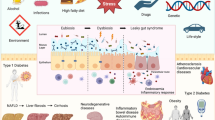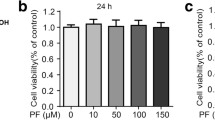Abstract
3,3′-Diselenodipropionic acid (DSePA), a synthetic organoselenium compound, has received considerable attention because of its antioxidant properties and safety. Its protective effect against dextran sodium sulfate (DSS)–induced mouse ulcerative colitis (UC) and the role of T helper 17 (Th17) cell proliferation were investigated. Fifty C57BL/6 male mice were randomly assigned to one of five groups: control (Con), DSePA, DSS, low-dose DSePA (LSe), and high-dose DSePA (HSe). Mice in the DSS, LSe, and HSe groups drank 2% DSS to induce UC, and received normal saline, 1 and 2 mg/mL DSePA solution by intraperitoneal injection, respectively. The DSePA group only received 2 mg/mL DSePA solution. After 5 weeks, DSS challenge induced UC in the mice, which manifested as decreased body weight, shortened colon length, the loss of goblet cells, activated proliferating cells, and multiple signs of intestinal lesions by histological observation, all of which were reversed to varying degrees by DSePA administration. DSS upregulated the colonic protein expression of the macrophage marker F4/80 and proinflammatory cytokines (IL-1β, IL-6, and TNFα), whereas DSePA administration downregulated the expression of these factors. DSS upregulated the mRNA expression of retinoic acid receptor–related orphan receptor γt (RORγt, mainly expressed in Th17 cells), IL-17A, and IL-17F and the levels of IL-17A and IL-17F in the colon, whereas DSePA administration decreased them. No difference was observed between the Con group and the DSePA group without DSS induction. Thus, DSePA administration ameliorated DSS-induced UC by regulating Th17-cell proliferation and the secretion of proinflammatory cytokines.






Similar content being viewed by others
Data Availability
The datasets used or analyzed during the current study are available from the corresponding author on reasonable request.
References
Podolsky DK (2002) Inflammatory bowel disease. N Engl J Med 347:417–429. https://doi.org/10.1056/NEJMra020831
Sang LX, Chang B, Zhu JF, Yang FL, Li Y, Jiang XF, Wang DN, Lu CL, Sun X (2017) Sodium selenite ameliorates dextran sulfate sodium-induced chronic colitis in mice by decreasing Th1, Th17, and γδT and increasing CD4(+) CD25(+) regulatory T-cell responses. World J Gastroenterol 23:3850–3863. https://doi.org/10.3748/wjg.v23.i21.3850
Han L, Yang J, Wang X, Li D, Lv L, Li B (2014) Th17 cells in autoimmune diseases. Front Med 9:10–19. https://doi.org/10.1007/s11684-015-0388-9
Zhang M, Zhou L, Xu Y, Yang M, Xu Y, Komaniecki GP, Kosciuk T, Chen X, Lu X, Zou X, Linder ME, Lin H (2020) A STAT3 palmitoylation cycle promotes TH 17 differentiation and colitis. Nature 586:434–439. https://doi.org/10.1038/s41586-020-2799-2
Kunwar A, Priyadarsini KI, Jain VK (2020) 3,3′-Diselenodipropionic acid (DSePA): a redox active multifunctional molecule of biological relevance. Biochim Biophys Acta Gen Subj 1865:129768. https://doi.org/10.1016/j.bbagen.2020.129768
Shi C, Yue F, Shi F, Qin Q, Wang L, Wang G, Mu L, Liu D, Li Y, Yu T, She J (2021) Selenium-containing amino acids protect dextran sulfate sodium-induced colitis via ameliorating oxidative stress and intestinal inflammation. J Inflam Res 14:85–95. https://doi.org/10.2147/JIR.S288412
Kunwar A, Bag PP, Chattopadhyay S, Jain VK, Priyadarsini KI (2011) Anti-apoptotic, anti-inflammatory, and immunomodulatory activities of 3,3′-diselenodipropionic acid in mice exposed to whole body γ-radiation. Arch Toxicol 85:1395–1405. https://doi.org/10.1007/s00204-011-0687-0
Gandhi VV, Gandhi KA, Kumbhare LB, Goda JS, Gota V, Priyadarsini KI, Kunwar A (2021) 3,3′-Diselenodipropionic acid (DSePA) induces reductive stress in A549 cells triggering p53-independent apoptosis a novel mechanism for diselenides. Free Radic Biol Med 175:1–17. https://doi.org/10.1016/j.freeradbiomed.2021.08.017
Kunwar A, Bansal P, Kumar SJ, Bag PP, Paul P, Reddy ND, Kumbhare LB, Jain VK, Chaubey RC, Unnikrishnan MK, Priyadarsini KI (2010) In vivo radioprotection studies of 3,3′-diselenodipropionic acid, a selenocystine derivative. Free Radic Biol Med 48:399–410. https://doi.org/10.1016/j.freeradbiomed.2009.11.009
Gandhi KA, Goda JS, Gandhi VV, Sadanpurwala A, Jain VK, Joshi K, Epari S, Rane S, Mohanty B, Chaudhari P, Kembhavi S, Kunwar A, Gota V, Priyadarsini KI (2019) Oral administration of 3,3′-diselenodipropionic acid prevents thoracic radiation induced pneumonitis in mice by suppressing NF-kB/IL-17/G-CSF/neutrophil axis. Free Radic Biol Med 145:8–19. https://doi.org/10.1016/j.freeradbiomed.2019.09.009
Perše M, Cerar A (2012) Dextran sodium sulphate colitis mouse model: traps and tricks. J Biomed Biotechnol 2012:718617. https://doi.org/10.1155/2012/718617
Kobayashi K, Ashina K, Derouiche S, Hamabata T, Nakamura T, Nagata N, Takenouchi S, Tominaga M, Murata T (2021) 5,6-dihydroxy-8Z,11Z,14Z,17Z-eicosatetraenoic acid accelerates the healing of colitis by inhibiting transient receptor potential vanilloid 4-mediated signaling. FASEB J 35:e21238. https://doi.org/10.1096/fj.201903207RRR
Zhong Y, Jin Y, Zhang Q, Mao B, Tang X, Huang J, Guo R, Zhao J, Cui S, Chen W (2022) Comparison of selenium-enriched Lactobacillus paracasei, selenium-enriched yeast, and selenite for the alleviation of DSS-induced colitis in mice. Nutrients 14:2433. https://doi.org/10.3390/nu14122433
Chen H, Du G, Yan X, Ye H, Guo Q, Wang Z, Yuan Y, Yue T (2022) Selenium-enriched Pediococcus acidilactici MRS-7 alleviates patulin-induced jejunum injuries in mice and its possible mechanisms. J Agric Food Chem 70:4755–4764
Andrés-Sánchez N, Fisher D, Krasinska L (2022) Physiological functions and roles in cancer of the proliferation marker Ki-67. J Cell Sci 135: jcs258932. https://doi.org/10.1242/jcs.258932.
Hirsch S, Gordon S (1982) The use and limitation of monoclonal antibodies against mononuclear phagocytes. Immunobiology 161:298–307. https://doi.org/10.1016/S0171-2985(82)80086-7
Camporeale A, Poli V (2012) IL-6, IL-17 and STAT3: a holy trinity in auto-immunity? Front Biosci (Landmark Ed) 17:2306–2326. https://doi.org/10.2741/4054
Zúñiga LA, Jain R, Haines C, Cua DJ (2013) Th17 cell development: from the cradle to the grave. Immunol Rev 252:78–88. https://doi.org/10.1111/imr.12036
Zhao Y, Chen H, Li W, He Q, Liang J, Yan X, Yuan Y, Yue T (2022) Selenium-containing tea polysaccharides ameliorate DSS-induced ulcerative colitis via enhancing the intestinal barrier and regulating the gut microbiota. Int J Biol Macromol 209(Pt A):356–366. https://doi.org/10.1016/j.ijbiomac.2022.04.028.
Britton GJ, Contijoch EJ, Mogno I, Vennaro OH, Llewellyn SR, Ng R, Li Z, Mortha A, Merad M, Das A, Gevers D, McGovern DPB, Singh N, Braun J, Jacobs JP, Clemente JC, Grinspan A, Sands BE, Colombel JF, Dubinsky MC, Faith JJ (2019) Microbiotas from humans with inflammatory bowel disease alter the balance of gut Th17 and RORγt + regulatory T cells and exacerbate colitis in mice. Immunity 50:212-224.e4. https://doi.org/10.1016/j.immuni.2018.12.015
Strober W, Fuss IJ (2011) Proinflammatory cytokines in the pathogenesis of inflammatory bowel diseases. Gastroenterology 140:1756–1767. https://doi.org/10.1053/j.gastro.2011.02.016
Zhu C, Ling Q, Cai Z, Wang Y, Zhang Y, Hoffmann PR, Zheng W, Zhou T, Huang Z (2016) Selenium-containing phycocyanin from Se-enriched Spirulina platensis reduces inflammation in dextran sulfate sodium-induced colitis by inhibiting NF-κB activation. J Agric Food Chem 64:5060–5070. https://doi.org/10.1021/acs.jafc.6b01308
Kassab RB, Elbaz M, Oyouni AAA, Mufti AH, Theyab A, Al-Brakati A, Mohamed HA, Hebishy AMS, Elmallah MIY, Abdelfattah MS, Abdel Moneim AE (2022) Anticolitic activity of prodigiosin loaded with selenium nanoparticles on acetic acid–induced colitis in rats. Environ Sci Pollut Res Int 29:55790–55802. https://doi.org/10.1007/s11356-022-19747-1
Cai J, Liu J, Fan P, Dong X, Zhu K, Liu X, Zhang N, Cao Y (2021) Dioscin prevents DSS-induced colitis in mice with enhancing intestinal barrier function and reducing colon inflammation. Int Immunopharmacol 99:108015. https://doi.org/10.1016/j.intimp.2021.108015
Zhang H, Wang J, Lang W, Liu H, Zhang Z, Wu T, Li H, Bai L, Shi Q (2022) Albiflorin ameliorates inflammation and oxidative stress by regulating the NF-κB/NLRP3 pathway in Methotrexate-induced enteritis. Int Immunopharmacol 109:108824. https://doi.org/10.1016/j.intimp.2022.108824
Xavier RJ, Podolsky DK (2007) Unravelling the pathogenesis of inflammatory bowel disease. Nature 448(7152):427–434. https://doi.org/10.1038/nature06005
Ivanov II, McKenzie BS, Zhou L, Tadokoro CE, Lepelley A, Lafaille JJ, Cua DJ, Littman DR (2006) The orphan nuclear receptor RORgammat directs the differentiation program of proinflammatory IL-17+ T helper cells. Cell 126:1121–1133. https://doi.org/10.1016/j.cell.2006.07.035
Katz Y, Nadiv O, Beer Y (2001) Interleukin-17 enhances tumor necrosis factor alpha-induced synthesis of interleukins 1, 6, and 8 in skin and synovial fibroblasts: a possible role as a “fine-tuning cytokine” in inflammation processes. Arthritis Rheum 44:2176–2184. https://doi.org/10.1002/1529-0131(200109)44:9%3c2176:aid-art371%3e3.0.co;2-4
Fujino S, Andoh A, Bamba S, Ogawa A, Hata K, Araki Y, Bamba T, Fujiyama Y (2003) Increased expression of interleukin 17 in inflammatory bowel disease. Gut 52:65–70. https://doi.org/10.1136/gut.52.1.65
Wu Z, Pan D, Jiang M, Sang L, Chang B (2021) Selenium-enriched Lactobacillus acidophilus ameliorates dextran sulfate sodium-induced chronic colitis in mice by regulating inflammatory cytokines and intestinal microbiota. Front Med (Lausanne) 8:716816. https://doi.org/10.3389/fmed.2021.716816
Johnson DE, O’Keefe RA, Grandis JR (2018) Targeting the IL-6/JAK/STAT3 signalling axis in cancer. Nat Rev Clin Oncol 15:234–248. https://doi.org/10.1038/nrclinonc.2018.8
Camporeale A, Poli V (2012) IL-6, IL-17 and STAT3: a holy trinity in auto-immunity? Front Biosci (Landmark Ed) 17:2306–2326. https://doi.org/10.2741/4054
Suzuki A, Hanada T, Mitsuyama K, Yoshida T, Kamizono S, Hoshino T, Kubo M, Yamashita A, Okabe M, Takeda K, Akira S, Matsumoto S, Toyonaga A, Sata M, Yoshimura A (2001) CIS3/SOCS3/SSI3 plays a negative regulatory role in STAT3 activation and intestinal inflammation. J Exp Med 193(4):471–481. https://doi.org/10.1084/jem.193.4.471
Zhou L, Zhang M, Wang Y, Dorfman RG, Liu H, Yu T, Chen X, Tang D, Xu L, Yin Y, Pan Y, Zhou Q, Zhou Y, Yu C (2018) Faecalibacterium prausnitzii produces butyrate to maintain Th17/Treg balance and to ameliorate colorectal colitis by inhibiting histone deacetylase 1. Inflamm Bowel Dis 24:1926–1940. https://doi.org/10.1093/ibd/izy182
Funding
This work was supported by the Research on the Safe Range of Dietary Selenium Intake (International Cooperation) (D20180031), and the Special Fund for Functional Agricultural Development of Nanjing National Agricultural Innovation Park (NJGJNCY-FAST01).
Author information
Authors and Affiliations
Contributions
Jia-Ying Xu, Li-Qiang Qin, and Xue-Bin Yin designed the experiments; Jia-Yang Zheng and Lin Zhang performed this animal study; Jia-Yang Zheng and Zhang-Min Wang analyzed the data; Jia-Yang Zheng and Li Qiang Qin prepared the paper; Jia-Ying Xu, Xue-Bin Yin, and Li-Qiang Qin supervised the research. All authors read and approved the final manuscript.
Corresponding author
Ethics declarations
Ethics Approval
All the experiments were carried out in accordance with the Guidelines for the Care of Animals, and all experimental procedures were approved by Soochow University Animal Welfare Committee (202103A353).
Competing Interests
The authors declare no competing interests.
Additional information
Publisher's Note
Springer Nature remains neutral with regard to jurisdictional claims in published maps and institutional affiliations.
Rights and permissions
Springer Nature or its licensor (e.g. a society or other partner) holds exclusive rights to this article under a publishing agreement with the author(s) or other rightsholder(s); author self-archiving of the accepted manuscript version of this article is solely governed by the terms of such publishing agreement and applicable law.
About this article
Cite this article
Zheng, JY., Xu, JY., Zhang, L. et al. Effect of 3,3′-diselenodipropionic Acid on Dextran Sodium Sulfate–Induced Ulcerative Colitis in Mice. Biol Trace Elem Res 201, 3961–3970 (2023). https://doi.org/10.1007/s12011-022-03491-1
Received:
Accepted:
Published:
Issue Date:
DOI: https://doi.org/10.1007/s12011-022-03491-1




